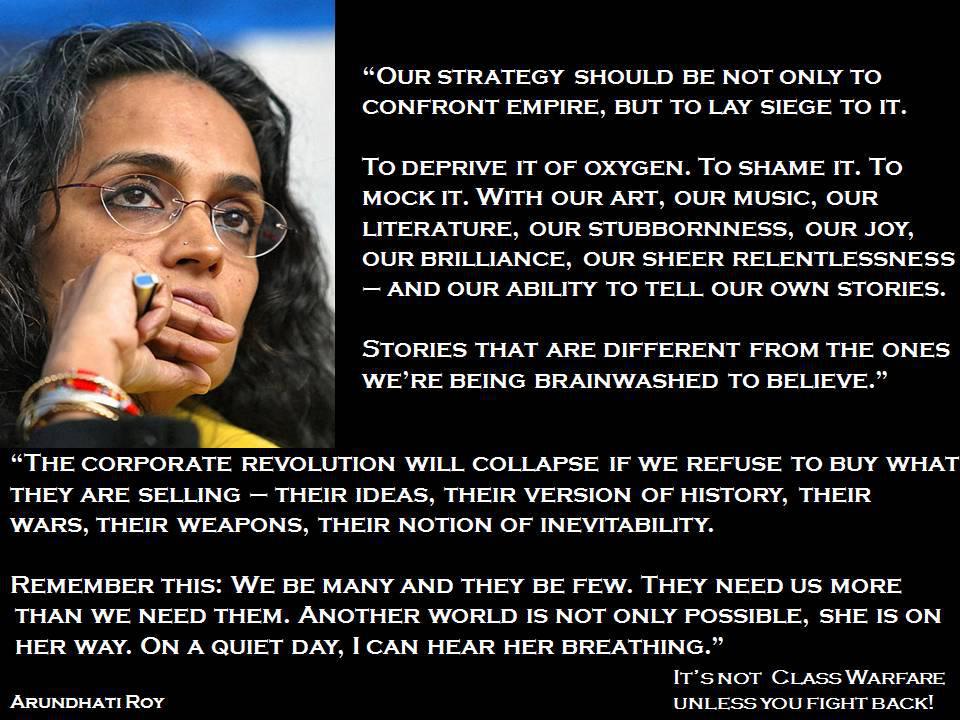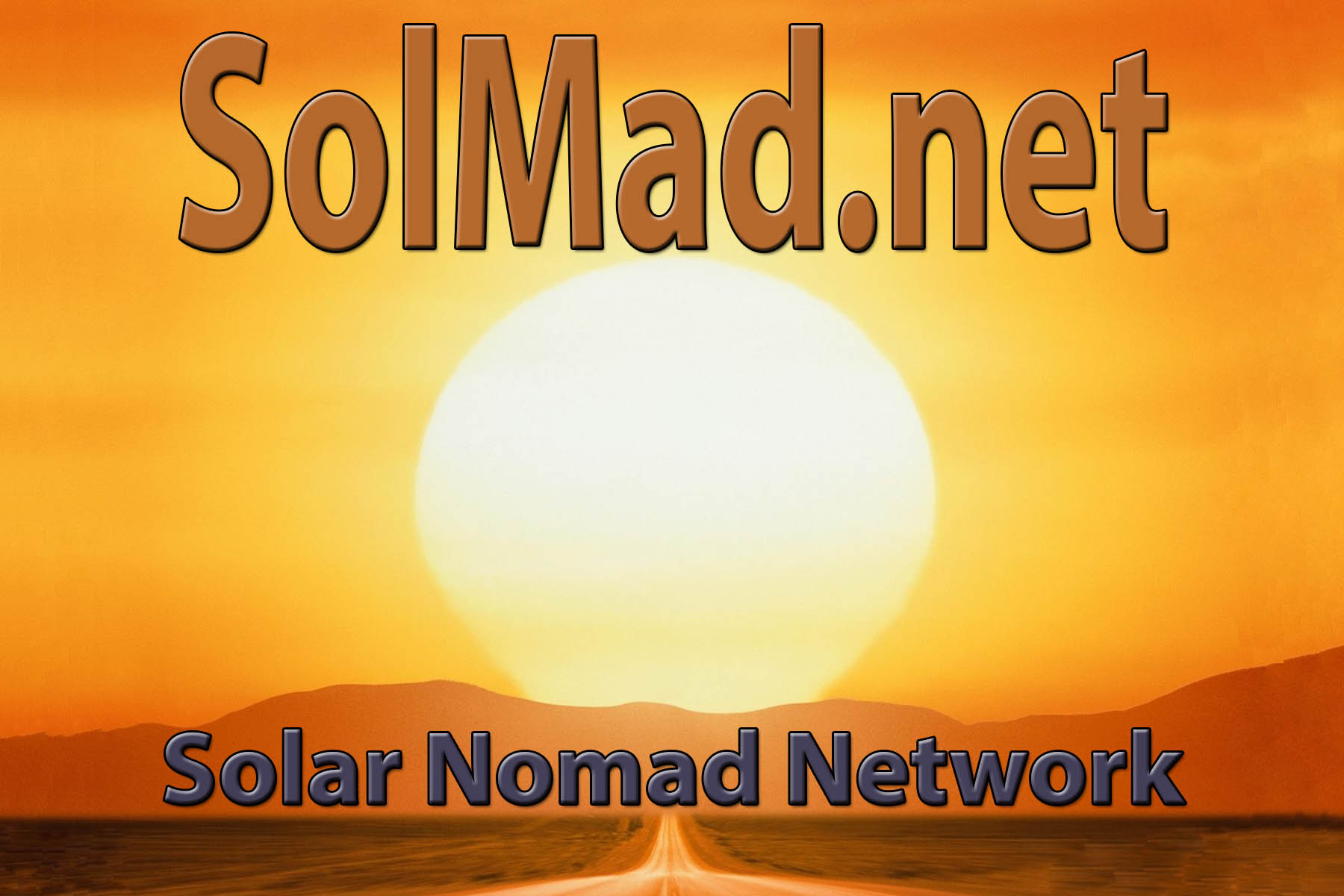
Solar Nomads are Everywhere:
SolMad.net allows human solmads to know of one another—to connect.
Solmads are: organisms that (1) are mobile, (2) are energized by the
sun, (3) are interconnected—they network. Most animals are solmads while
most plants are not. Green plants, the producers, can best take in
sunshine while remaining fixed. Solmads get their sun indirectly—are
mutualists, commensalists, or parasites, and do better on the move.
Solmads are mobile symbionts ("together" + "living"). To hunt and
gather, all humans were once solmads. Most humans in the 21st century are not.
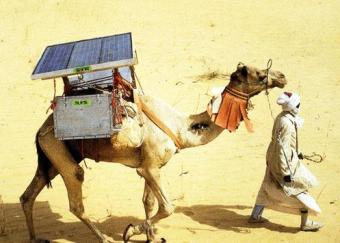 Most humans living in
the growth culture of the early 21st century depend on fossilized power
to support their high-powered lives. The flash they live in has lasted
several centuries and for some may go on and on, but few will be able to
continue to live the high life. There may always be high lifers,
hyper-consumers, but most humans will not be among them nor want to be
because to want what you can't have is unhappiness. To want what you can
have and should have is to be a solmad.
Most humans living in
the growth culture of the early 21st century depend on fossilized power
to support their high-powered lives. The flash they live in has lasted
several centuries and for some may go on and on, but few will be able to
continue to live the high life. There may always be high lifers,
hyper-consumers, but most humans will not be among them nor want to be
because to want what you can't have is unhappiness. To want what you can
have and should have is to be a solmad.
The "should" implies an ethical consideration. The default "business-as-usual" culture is posterity-blind where the putative "sanctity" of human life does not apply to future generations. Thinking seven generations ahead seems pointless to those in power. If human life is the summum bonum, then laying waste to a planet's carrying capacity, its life support system, because it profits the living should be questioned considering that posterity will vastly outnumber present living humans. If the prevailing presumed ethics are unethical, cease to be part of it.
We can have solshine for the basking in. Petrochemicals are here today, then added to the atmosphere. A preferred alternative to craving high-powered ways is to want “power enough,” as to not have enough power entails suffering and has extinction as the end point. It is possible to thrive on less. It is not possible, in the long run, to survive, much less thrive, on ever more and MORE! extracted from a finite planet. The choice is to make the better choice or go out with a bang or a whimper.
Human solmads are few. Few choose “enough” when “MORE” is available for the taking. Few choose to live sustainable, resilient, transitional lives of moderation by embracing limits (other than limits to love and learning which exist but need not be embraced). The hyper-consumer life is the unexamined life and neither are worth living. The corporatocracy will pass away. Consider hitching your wagon to a star. There happens to be one nearby.
The asolmads live apart from nature, attached to their grid, and believe their growth culture will come to be fueled and sustained [somehow] by power without limit, eventually so abundant it will be too cheap to meter. They hope to put a bit of sun in a bottle and maintain their dominion over all. If their faith is fulfilled, their all consuming ways will make a Trantor of Earth. They will make a planet none other will find tolerable to live on. All solmads will pass away, other than those in name only that may be kept as pets or in zoos to amuse.
To be clear: continued growth without end, the wet dream of the asolmad collective, would be the worst possible outcome for all other life forms known. As growth demands expansion beyond the surface of one planet—into the Solar System, nearby systems, the Local Fluff, the Local Bubble, the Gould Belt, the Orion Arm, the Milky Way Galaxy...... Consuming one galaxy would whet the collective's appetite for more—the Local Group, the Laniakea Supercluster, the knowable universe......, meaning all life forms yet to be known would be at risk too. The Borg-like collective's growth would end in collapse when the universe had been subsumed (if not before). But prior to collapse, prior to reality creeping in, the growthers would fervently believe that it was multiverses all the way down ad infinitum, that there were surely no limits to growth.
Solmads think otherwise, consider alternatives, and live accordingly. It's an ethical thing and a long-term survival thing.
Meet the Solmads
Solmads may travel alone. None will follow, but some may flow together on occasion, like bubbles on a stream. SolMad.net allows fellow travelers to know of one another, to connect in the online or hadronic world. All that is needed to join is an email address. No other personal information is required. The email address will be known only to the site server and knowable only to the site admin who doesn't want to know it. Messaging between members is private. Members, to make themselves known, will blog about their travels. By your journey will we know thee.
Members get their own WordPress blog to post text and photos to.
The site is free and free of ads. Donations will be needed to keep it
all going, but as the site is a gift, so too must be any donations.
The Ways of the Solmad
Solmads eschew fossil conveyance and the high-power life. There are other ways of moving, those of: walkers, runners, rollers (cyclists), paddlers, and sailors. Power can be human/animal power (fueled by food), wind, or solar. Were it not for Sol there would be no wind and less food, and Sol is enough to meet our needs if not our inculcated wants.
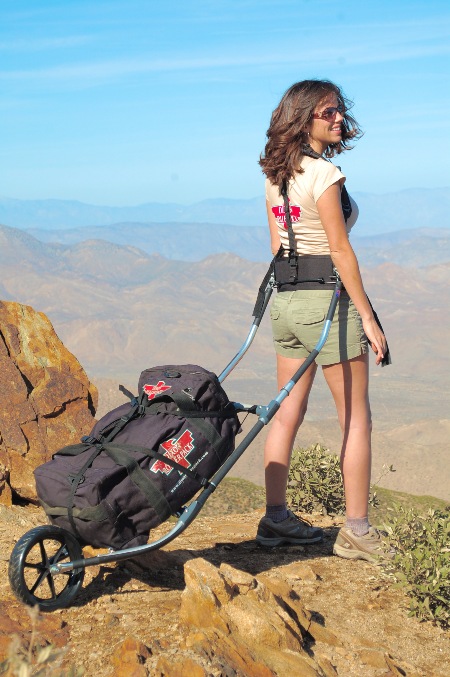 Back
in the day of wide open spaces, animals could forage to fuel themselves
and could be used to pull or carry humans and their belongings. The
world is smaller per person, much smaller, and using animal mutualists
for transportation is an atavistic option. Dogs were once used to pull
travois. Humans and horses also pulled them. When the long sticks wore
down, new ones were cut. Adding a wheel or two greatly increases
efficiency, and is an example of technology that enables. Humans can go
long distances carrying a backpack, but on trails, pulling a travois
takes less energy and is much less backbreaking.
Back
in the day of wide open spaces, animals could forage to fuel themselves
and could be used to pull or carry humans and their belongings. The
world is smaller per person, much smaller, and using animal mutualists
for transportation is an atavistic option. Dogs were once used to pull
travois. Humans and horses also pulled them. When the long sticks wore
down, new ones were cut. Adding a wheel or two greatly increases
efficiency, and is an example of technology that enables. Humans can go
long distances carrying a backpack, but on trails, pulling a travois
takes less energy and is much less backbreaking.
Walking is an option. Those who have the ability should consider using it. With advancing age on the down side of peak, all humans become increasingly disabled. If carrying a backpack for weeks on end is not an option, consider a travois, and if/when that is too tasking, consider......
On roads paved or merely scraped, rolling on wheels takes far less power and minimizes fatigue to a tolerable point for many. Bicycles have long been a technology that enables. For just carrying a human and about the same amount of gear a backpacker could manage, cycling is a great enabler. Those who are or want to be very fit can cycle 80 km (50 mi) a day. The athletic can go further and faster, but going 80 km a day, day after day, will take you further, faster, in more comfort, and using far less energy per distance traveled than walking or riding a horse.
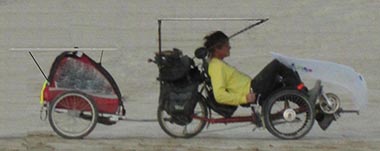 Rolling is an
option. Those who can't pedal far or fast enough can get assistance from
the sun via a solar powered electric motor added to a cycle. If
solmading by bicycle, the solar panels could be deployed when not riding
to charge a battery, or panels could be carried so as to charge while
riding and also to power the motor.
Rolling is an
option. Those who can't pedal far or fast enough can get assistance from
the sun via a solar powered electric motor added to a cycle. If
solmading by bicycle, the solar panels could be deployed when not riding
to charge a battery, or panels could be carried so as to charge while
riding and also to power the motor.
Panels can be mounted on an upright bike, but trailers and trikes are more stable platforms for carrying enough solar to climb tall mountains while carrying a load. E-bikes and e-trikes also represent technology that enables. Many human solmads, the early adapters, are technophiles, but lovers only of appropriate technology that enables.
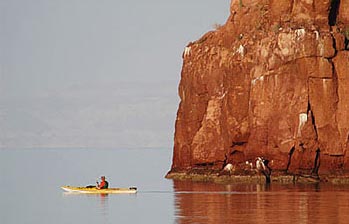 Paddle power can take
water borne travelers far. A kayak can carry a person and enough
gear/food for month long outings. A kite can pull a small boat downwind.
To tack into the wind, a sailboat is needed with a sailor at the helm.
Paddle power can take
water borne travelers far. A kayak can carry a person and enough
gear/food for month long outings. A kite can pull a small boat downwind.
To tack into the wind, a sailboat is needed with a sailor at the helm.
Sailboats can travel the watery world. It is a special solmad who
sails. In the big oceans a small boat is at a disadvantage and needs to
be left behind to explore the land. 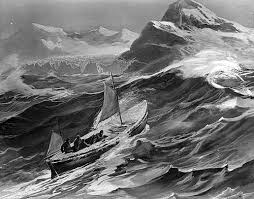 While exploring Terra, small bodies of fresh water are often found and sea going vessels are hard to transport over land.
While exploring Terra, small bodies of fresh water are often found and sea going vessels are hard to transport over land.
A solar powered e-trike could pull a kayak on a trailer covered with enough solar panels to go from coast to coast, from Hudson Bay to the Straights of Magellan. Technology has limits. What can brave the high seas may not float well in a pond or cross a desert.
 Solmads
may travel far or saunter forth from a home base on their vision quest.
Thoreau was a walker solmad extraordinaire who also paddled. The planet
is too full to allow all solmads to wander and live by gathering their
sustenance from nature as their ancestors once did. Agriculture limits
mobility but does not preclude it. Humans have been practicing
agriculture, often unsustainably, for only a few thousand years and
getting it right may take awhile. Humans can farm parts of the planet,
but they need to resist making excessive claims upon it and leave room
for nature.
Solmads
may travel far or saunter forth from a home base on their vision quest.
Thoreau was a walker solmad extraordinaire who also paddled. The planet
is too full to allow all solmads to wander and live by gathering their
sustenance from nature as their ancestors once did. Agriculture limits
mobility but does not preclude it. Humans have been practicing
agriculture, often unsustainably, for only a few thousand years and
getting it right may take awhile. Humans can farm parts of the planet,
but they need to resist making excessive claims upon it and leave room
for nature.
It is possible to live on Earth as a solmad for a time, one among not too many, or to live as a cog working to lay waste to it. Choices can still be made. Those who solmad, they who can no longer live off the degraded land, may depend on the kindness of those they meet along the way. In return they can offer stories, answer questions the curious may have, wash the dishes, work in the garden, or whatnot. Solmads don't need a place to stay as they carry their house with them—just an area outdoors to bed down and perhaps some food to fuel the fires within.
If you would consider hosting one or more solmads, contact
SolMad.net, providing location, contact and other relevant info. Only
solmads passing through your area will be allowed to know of your offer,
may contact you, and if no longer able to host, say so or simply don't
reply to any email or text message. Solmadding depends on some others
providing some hospitality, but they are not dependent on any one
benefactor.
[read less]

